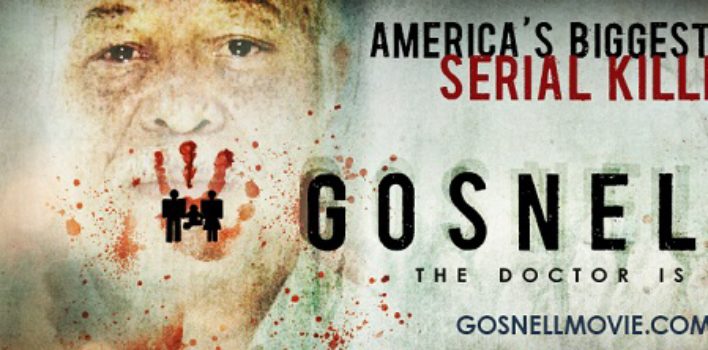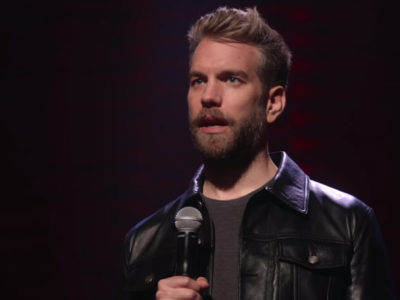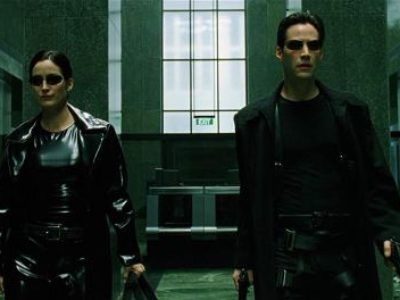Review| Gosnell: The Trial of America’s Biggest Serial Killer
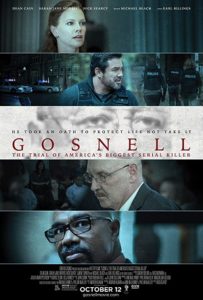 The opening credits of Gosnell include the claim of accurately representing court records, police documents, and eyewitness accounts. It goes a leap beyond your typical “based on a true story” claim. This becomes fairly evident with the opening scenes playing out as though they were following a police report rather than a screenplay. That’s not all bad, as the content is inherently dramatic and interesting. Detective’s Wood (Dean Cain) and Stark (Alfonzo Rachel) with the Philadelphia Police Department converge unknowingly with the FBI and the DEA in attempting to bust what they suspect is an illegal prescription drug trafficking operation. When the buyer confesses to purchasing the OxyContin for Dr. Kermit Gosnell, the plot thickens.
The opening credits of Gosnell include the claim of accurately representing court records, police documents, and eyewitness accounts. It goes a leap beyond your typical “based on a true story” claim. This becomes fairly evident with the opening scenes playing out as though they were following a police report rather than a screenplay. That’s not all bad, as the content is inherently dramatic and interesting. Detective’s Wood (Dean Cain) and Stark (Alfonzo Rachel) with the Philadelphia Police Department converge unknowingly with the FBI and the DEA in attempting to bust what they suspect is an illegal prescription drug trafficking operation. When the buyer confesses to purchasing the OxyContin for Dr. Kermit Gosnell, the plot thickens.
Upon discovery of a death due to overdose in Gosnell’s clinic, the Philadelphia PD gets a warrant to join the FBI and DEA in their investigation into the clinic. For me, this is where the film really gets going. The conditions in the clinic are atrocious; bags of medical waste lining stairwells, cat feces scattered throughout the hallways, and blood-stained medical devices lying unattended, as if ready to be used again. The handheld camera view and search through the facility plays out like a horror film as much as a criminal investigation. I am told the description given in the book makes the depiction in the movie look like a suitable daycare. This isn’t the only area in which the film censors certain details of the case, opting out of the opportunity to maximize the visual impact. This decision appears to be an intentional effort to stick with the facts in hopes of maintaining a larger audience and staying away from accusations of sensationalizing the matter and playing to the right wing base to whom this film already appeals.
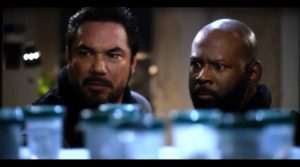 As the investigation evolves into a capital murder trial, the politics of putting an abortion doctor on trial for murder begin to play a role. The judge during the discovery phase insists (demands) that this not turn into a debate about a woman’s right to choose. Defense attorney Cohan (Nick Searcy) claims Detective Woods’ Catholic religion played a role in deciding to bring Gosnell to trial. And the media are entirely absent from the first days of opening statements and witness testimony, allegedly out of fear of touching abortion on trial. The only “reporter” bringing light to the case at all is Molly Mullaney (Cyrina Fiallo) with her self-titled blog. Her social media blast of the empty pews in the media section help to spark the national headlines American public outrage in 2013. The absent media hysteria felt like a missed opportunity for dramatic flair in this film. I remember seeing headlines on social media at the time about Gosnell and his atrocities. With a prosecuting attorney that claimed to be pro-choice – or at least others claimed that she is pro-choice – this would’ve been a perfect plot point to enhance her inner turmoil at appearing to prosecute a medical practice with which she agrees. Again the script seems bent on sticking with the actual events and leaving out the influence of the media. Instead we got 2-3 short attempts at highlighting her emotional response to pictures or descriptions of the babies that Gosnell murdered. More time spent with her outside the courtroom hounded by the media, or in heated debates with colleagues would have gone a long way to increase the tension in the courtroom.
As the investigation evolves into a capital murder trial, the politics of putting an abortion doctor on trial for murder begin to play a role. The judge during the discovery phase insists (demands) that this not turn into a debate about a woman’s right to choose. Defense attorney Cohan (Nick Searcy) claims Detective Woods’ Catholic religion played a role in deciding to bring Gosnell to trial. And the media are entirely absent from the first days of opening statements and witness testimony, allegedly out of fear of touching abortion on trial. The only “reporter” bringing light to the case at all is Molly Mullaney (Cyrina Fiallo) with her self-titled blog. Her social media blast of the empty pews in the media section help to spark the national headlines American public outrage in 2013. The absent media hysteria felt like a missed opportunity for dramatic flair in this film. I remember seeing headlines on social media at the time about Gosnell and his atrocities. With a prosecuting attorney that claimed to be pro-choice – or at least others claimed that she is pro-choice – this would’ve been a perfect plot point to enhance her inner turmoil at appearing to prosecute a medical practice with which she agrees. Again the script seems bent on sticking with the actual events and leaving out the influence of the media. Instead we got 2-3 short attempts at highlighting her emotional response to pictures or descriptions of the babies that Gosnell murdered. More time spent with her outside the courtroom hounded by the media, or in heated debates with colleagues would have gone a long way to increase the tension in the courtroom.
As for that courtroom drama, Nick Searcy (who also directed this film) commands the room when he speaks. Whether leading the witness to expose the harsh reality behind a dilution & evacuation (D&E) abortion, or screaming in outrage at the notion of a respectful doctor on trial for doing his job, Searcy comes off as formidable and crafty.
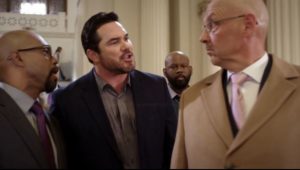 Unfortunately the opposing side doesn’t quite measure up. Prosecuting attorney Lexy McGuire (Sara Morris) often feels bland and somewhat unmotivated in her examination of the witnesses and evidence, save for one moment where she must turn away to compose herself. Even that felt scripted, like she was acting for the jury. Again, more dramatic or confrontational moments should have been given to her character leading up to or outside of the courtroom, assisting in giving the moments during the trial more weight.
Unfortunately the opposing side doesn’t quite measure up. Prosecuting attorney Lexy McGuire (Sara Morris) often feels bland and somewhat unmotivated in her examination of the witnesses and evidence, save for one moment where she must turn away to compose herself. Even that felt scripted, like she was acting for the jury. Again, more dramatic or confrontational moments should have been given to her character leading up to or outside of the courtroom, assisting in giving the moments during the trial more weight.
Enough cannot be said of Earl Billings’ portrayal of Kermit Gosnell. Whether the real man ate Chinese carry-out with blood-stained gloves, or had a disturbing grin when discussing his practice, hardly matters. Billings fully sold the image of an arrogant, sociopathic murderer convinced that he’s doing nothing wrong and insistent that he’s providing real care.
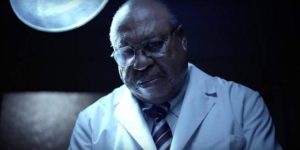 Narratively, this is a film that plays out quite smoothly. As many have said, it follows a “Law & Order” format, moving from a police procedural into a courtroom drama. The presence of many right-wing pundits, writers, and actors in the cast brings with it the temptation to classify this somewhere along with many faith-based films of late – though it is definitely not a faith based film. A common problem with such films is their out-of-sync preachiness and insistence on message over story. I remember thinking War Room was little more than a collage of about 5 sermon illustrations thrown onto the screen. Gosnell is not that kind of movie. Andrew Klavan’s screenplay never feels abrupt in its transitions or beholden to a political motivation. Never once do we hear an argument, or even a claim that all abortion is murder despite that very likely being the true beliefs of all or most involved in the making of this film. At nearly every turn, this feels like an honest attempt to tell the story of justice brought against a legitimately despicable murderer.
Narratively, this is a film that plays out quite smoothly. As many have said, it follows a “Law & Order” format, moving from a police procedural into a courtroom drama. The presence of many right-wing pundits, writers, and actors in the cast brings with it the temptation to classify this somewhere along with many faith-based films of late – though it is definitely not a faith based film. A common problem with such films is their out-of-sync preachiness and insistence on message over story. I remember thinking War Room was little more than a collage of about 5 sermon illustrations thrown onto the screen. Gosnell is not that kind of movie. Andrew Klavan’s screenplay never feels abrupt in its transitions or beholden to a political motivation. Never once do we hear an argument, or even a claim that all abortion is murder despite that very likely being the true beliefs of all or most involved in the making of this film. At nearly every turn, this feels like an honest attempt to tell the story of justice brought against a legitimately despicable murderer.


